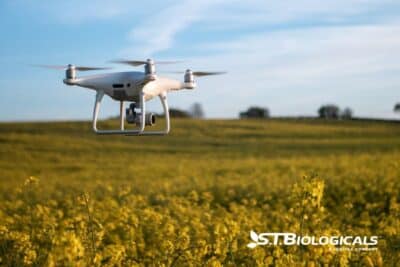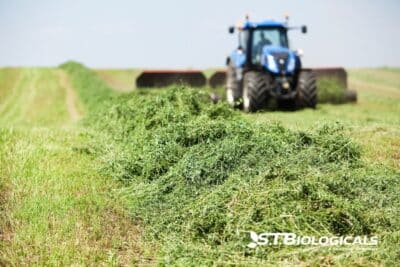Micronutrient deficiencies can significantly impact both crop yield and human nutrition. Plants need more than the macronutrients NPK to thrive and to develop a complex nutrient profile. For an in-depth look at how micronutrients impact crops, read this blog.
Some strategies include off-farm amendments but many solutions to micronutrient deficiencies can be found right on the farm.
1. Increasing Soil Organic Matter
This solution may require a change in farming practices. If you’ve been tilling every year you’re losing micronutrients to erosion and oxidation. Continuing to add inputs every year is no longer sustainable.
Increasing soil organic matter not only helps remedy the specific micronutrient you’re deficient in this year, but it also balances your soil. That balance makes deficiencies far less likely in the future.
Organic matter in the form of manure, compost, or decaying crop residue adds micronutrients with the aid of soil microorganisms. Decomposer microorganisms turn organic materials into nutrients available for plant uptake at the root zone.
2. Cover Crops for Micronutrient Balance
The ability of microorganisms to maintain a nutrient balance in your soil depends on the health of the microbial community. Microbes need living roots to thrive. After harvest the annual cash crop roots die. They are a source of some nutrition for microbes but not enough.
Cover crops all winter – and keeping your soil covered with living plants 24/7/365 – is the best environment for healthy microbial communities. Even in the northern plains where the ground freezes, the roots are still alive in many cover crops and microbes are active, just slower.
When you roll over your cover crops just before planting a cash crop, those roots are still alive. Microbes gradually release micronutrients into the soil from the decaying aboveground biomass. Planting in green balances soil nutrients, retains the microbial nutrient cycling, decreases weed pressure, and avoids soil compaction.
When you terminate cover crops through chemicals, such as glyphosate, your short-term goal of easy planting is attained. But the long-term detrimental effects on soil and microbial health mean you’ll be dependent on commercial synthetic fertilizers for micronutrients. The same micronutrients are already in your soil but in a form unavailable for plant uptake. Microbial action makes those nutrients available for free.
3. Soil Amendments
Many micronutrient deficiencies can be remedied through foliar or soil applications of amendments. Zinc, iron, and boron deficiencies can all be addressed through foliar applications of micronutrient-rich amendments.
At ST Biologicals, we recommend the nanoparticle micronutrient products from Aqua- Yield. These products are foliar sprays and more effective than the micronutrients themselves. You need less input, saving dollars, and improving the bottom line.
We also recommend the products from Purple Cow Organics to jumpstart your beneficial microbial community. With microbes active in your soil, plants are more resilient against drought, salty conditions, heat, and other abiotic stresses. Healthy plants have fewer pests and less disease issues.
Short-Term Gain vs Long-Term Benefits
In the short term, this season and next, soil amendments will remedy micronutrient deficiencies. But what about the long-term health of your farm’s soil and profitability? What is your legacy?
Because soil health and farm profitability are interchangeable. The generations of tillage, synthetic chemicals, and fallow fields have left us with erosion, loss of soil organic matter, and increasing input costs. Regenerative farming and ranching practices impact both short and long-term ag goals.
You can convert acres to regenerative without losing the farm. The biggest change necessary is in how you think about your land. Cover cropping requires an investment in seed and some different equipment. But the economics of regenerative ag outcompete conventional every time.
For more information on how regenerative ag practices could work on your farm contact our team at ST Biologicals. We’ve been helping farmers convert acres to regenerative for over a decade. Nobody’s lost the farm yet. Our clients are seeing more profit every year. Wouldn’t you want that as your legacy?
When soil speaks, we listen.
#soilhealth #covercrops #soilorganicmatter #soilamendments

